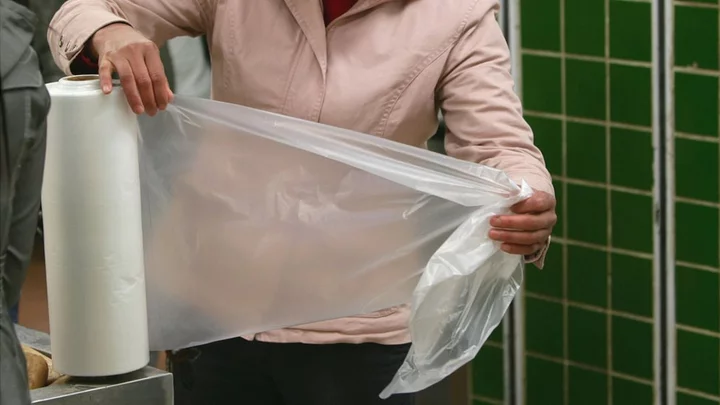
A 15-year-old boy was bitten by a shark while surfing off the coast of New York's Fire Island
A 15-year-old boy was attacked by a shark Monday afternoon as he was surfing off the coast of New York's Fire Island, police said.
2023-07-04 10:58

'I have been rejected by dozens of men over dowry'
A 27-year-old Indian woman has started a petition to put an end to the social evil of dowry.
2023-07-04 06:20

Baltimore shooting: Police hunt for suspects after dozens shot at block party
Gunfire erupted at a large block party in the city, leaving two dead and 28 others injured.
2023-07-03 21:25

Nutritionist explains how women can eat to help balance hormones
Some healthy eating principles apply to just about everyone – drinking enough water and consuming plenty of fresh fruit and veg, for example. But when it comes to hormones, a lot of diet advice neglects to mention the vast difference between women’s and men’s health. “Women are very under-represented in research, mainly because we have a menstrual cycle,” says functional nutritionist and author Pauline Cox. “My passion and mission is to empower women with the information and knowledge that can radically change their immediate health and their long-term health.” Cox, 43, who started her career as a physiotherapist before becoming a nutritionist, now mainly works with groups of women online and has just released her second book, Hungry Woman: Eating for Good Health, Happiness and Hormones. “I felt there was a lot of information that could be shared with women to help them understand their hormones, and understand that we don’t have to get frustrated with ourselves and fight our female physiology.” At the heart of the issue is the balance (or lack thereof) between oestrogen and progesterone levels. “When our progesterone levels are low, our oestrogen can become dominant, and that’s when we start to see things like PMS, heavy periods, painful periods, flooding at the beginning of our periods,” says Cox, who lives in Somerset. “A lot o women accept that as part of their monthly cycle, but when we bring our progesterone levels back up, it helps to balance the effect of oestrogen.” Here, she explains five ways women can tailor their diets to keep their hormones in check… 1. Look after your liver “Oestrogen is a driving-growth hormone,” Cox explains, using the analogy of grass growing on a lawn to explain how the two hormones interact. “Progesterone is like the lawnmower. It comes along and it keeps the grass in check. When we lose progesterone, oestrogen gets out of control.” That’s why it’s important that our bodies are able to clear oestrogen efficiently through the liver, gut and bowels. “How much oestrogen we clear can be influenced by what we eat and how we live,” says Cox. “There’s a lot of cruciferous in the book – cauliflower, broccoli, these are really great vegetables to support liver detoxification.” 2. Add fermented foods To deliver beneficial bacteria to your gut, try including fermented foods like pickled vegetables, kefir, kombucha or natural yoghurt as part of your daily diet. “Our gut diversity declines as we age and microbiome diversity has been linked with longevity and good health,” says Cox, who suggests just a tablespoon of sauerkraut a day can make a difference. “These are easy wins… to maximise our longevity and optimise our gut-brain axis, which is incredibly important.” 3. Avoid ultra-processed foods There’s been a lot of talk recently about how detrimental ultra-processed foods are, and that includes the effect on hormone levels. “When we’re eating high sugar, processed foods, our inflammatory levels go up and our cortisol level goes up, which robs us of progesterone,” Cox says. Plus, filling up with these empty calories – as delicious as they often are – means we have less room for nutritious foods. “They can often be devoid of nutrients, so you’re not getting the nutrients you need for building hormones and supporting hormonal health like magnesium, zinc, B vitamins, and omega three fatty acids.” 4. Create an eating window It’s not just what you eat, it’s when. Cox recommends having an ‘eating window’ during the day that ends around 6pm, so that there’s a gap of a few hours before you go to bed. “When your blood sugars go up at night, your kidneys have to kick in to try and remove this excess blood sugar, which then means you’re up in the night urinating,” she says. “A lot of women associate this with drinking a lot before bed, but actually eating late at night can also be for that reason.” Choosing meals that are nutritious and satisfying is the next step. “Within that window, start becoming a bit more conscious of your carbs and upping your protein,” she continues. “So you’re feeling full, your body’s getting all the amino acids it needs, and you’re maybe not having so much of the grab-and-go food like the sandwiches, the pasta, the crisps.” 5. Monitor your magnesium “Most women are sub-clinically deficient in magnesium,” Cox explains, which can cause insomnia, and the risk increases with age. “As we get to about the age of 40, we absorb less magnesium than we would have in our 20s.” Diet also plays a role: “If we have high blood sugars and levels of inflammation when we’re stressed, we lose magnesium.” She recommends taking a magnesium glycinate or bisglycinate supplement before bed to increase your chance of getting a good night’s sleep. “The glycine part of that helps to reduce your core body temperature, which is what the body wants when it’s going to bed,” she says. “That compound also helps get you into what’s called REM sleep, which is the sleep where you’re consolidating memories and learning.” ‘Hungry Woman’ by Pauline Cox (Ebury Press, £27). Read More From hairdressers to aloe vera: What will Diet Coke join as a ‘possible cancer risk’ Three quick and easy vegan fakeaway recipes The only three recipes you need to seize the summer How to shop at Borough Market in the summer
2023-07-03 21:19

Body recovered at Slieve League in County Donegal
The sea cliffs were closed for most of last week as police investigated an alleged assault.
2023-07-03 19:20

New Zealand bans plastic bags for fresh produce in supermarkets
Supermarkets already ban take-home bags but now thin bags used for vegetables will be outlawed too.
2023-07-03 13:53

Thai elephant flown home after alleged abuse in Sri Lanka
Bangkok demanded the return of the animal after claims it was tortured while kept at a Buddhist temple.
2023-07-03 12:53

Benodebehari Mukherjee: Blind Indian painter's forgotten scroll found after 100 years
Benodebehari Mukherjee who lost his vision entirely at 53 came to define modern art in 20th Century India.
2023-07-03 08:56

Israeli strikes on Palestinian Jenin camp in West Bank
A large-scale Israeli military operation is under way in the northern West Bank city of Jenin.
2023-07-03 07:55

Orkney council to look at proposals to become territory of Norway
The islands' councillors will consider a motion to investigate alternative forms of governance.
2023-07-02 16:50

India's spirited rum revolution
A host of homegrown brands are innovating with the spirit, creating new markets.
2023-07-02 07:56

Load-shedding could switch South Africans off the ANC
With South Africans experiencing worsening power cuts, the crisis is fuelling demands for change.
2023-07-02 07:50
